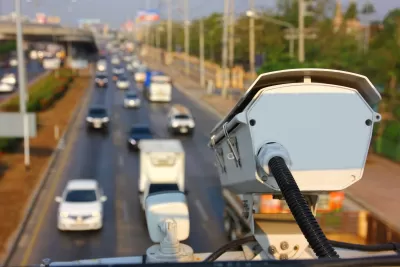The bill, aimed at testing speed cameras in the state to improve traffic safety, will go to the full State Assembly for a vote.

A California state bill that would create a speed camera pilot program in six cities took a major step when it cleared the Assembly Appropriations Committee, which it failed to do on several prior attempts. Now, as Melanie Curry reports in Streetsblog California, Assembly Bill 645 will go on to the full Assembly for a vote. If approved, it will move to the state Senate.
Automated traffic enforcement is a contentious topic, drawing criticism from a wide spectrum of opponents. Some groups, like the Western States Trucking Association, argue that the California bill is too vague and could impose hardships on low-income drivers, “despite the bills’ provisions for lower fines and multiple alternative arrangements for the fines.” Others, such as the American Civil Liberties Union (ACLU), raise concerns about privacy and disparate impacts on people of color, despite claims from supporters that cameras can reduce the potential for violent interactions with law enforcement.
Studies have repeatedly shown that traffic cameras help reduce average speeds and improve safety on dangerous roads.
FULL STORY: Speed Camera Bill Passes a Major Hurdle

Alabama: Trump Terminates Settlements for Black Communities Harmed By Raw Sewage
Trump deemed the landmark civil rights agreement “illegal DEI and environmental justice policy.”

Planetizen Federal Action Tracker
A weekly monitor of how Trump’s orders and actions are impacting planners and planning in America.

The 120 Year Old Tiny Home Villages That Sheltered San Francisco’s Earthquake Refugees
More than a century ago, San Francisco mobilized to house thousands of residents displaced by the 1906 earthquake. Could their strategy offer a model for the present?

In Both Crashes and Crime, Public Transportation is Far Safer than Driving
Contrary to popular assumptions, public transportation has far lower crash and crime rates than automobile travel. For safer communities, improve and encourage transit travel.

Report: Zoning Reforms Should Complement Nashville’s Ambitious Transit Plan
Without reform, restrictive zoning codes will limit the impact of the city’s planned transit expansion and could exclude some of the residents who depend on transit the most.

Judge Orders Release of Frozen IRA, IIJA Funding
The decision is a victory for environmental groups who charged that freezing funds for critical infrastructure and disaster response programs caused “real and irreparable harm” to communities.
Urban Design for Planners 1: Software Tools
This six-course series explores essential urban design concepts using open source software and equips planners with the tools they need to participate fully in the urban design process.
Planning for Universal Design
Learn the tools for implementing Universal Design in planning regulations.
Clanton & Associates, Inc.
Jessamine County Fiscal Court
Institute for Housing and Urban Development Studies (IHS)
City of Grandview
Harvard GSD Executive Education
Toledo-Lucas County Plan Commissions
Salt Lake City
NYU Wagner Graduate School of Public Service





























